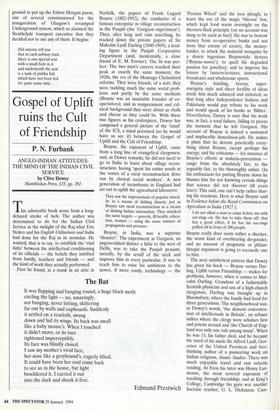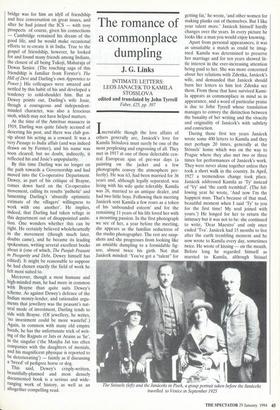Gospel of Uplift ruins the Cult of Friendship
P. N. Furbank
ANGLO-INDIAN ATTITUDES: THE MIND OF THE INDIAN CIVIL SERVICE by Clive Dewey Hambledon Press, f25, pp. 292 This admirable book arose from a long- delayed stroke of luck. The author was determined to do for the Indian Civil Service in the twilight of the Raj what Eric Stokes and his English Utilitarians and India had done for the Raj in its noonday. He wanted, that is to say, to establish the 'vital links' between the intellectual conditioning of its officials — the beliefs they imbibed from family, teachers and friends — and the kind of work they actually performed.
First he found, in a trunk in an attic in Norfolk, the papers of Frank Lugard Brayne (1882-1952), the conductor of a famous enterprise in village reconstruction in the Punjab (the `Gurgaon experiment'). Then, after long and vain searching, he tracked down the private papers of Sir Malcolm Lyall Darling (1880-1969), a lead- ing figure in the Punjab Cooperative Department (and, incidentally, a close friend of E. M. Forster). The fit was per- fect. The two men's careers reached their peak at exactly the same moment, the 1920s, the era of the Montagu Chelmsford reforms. They were friends, of a sort; they were tackling much the same social prob- lems and partly by the same methods (Brayne was an insatiable founder of co- operatives); and in temperament and cul- tural background they were about as chalk and cheese as they could be. With these two figures as his centrepiece, Dewey has composed a general picture of the 'mind' of the ICS, a mind polarised (so he would have us see it) between the Gospel of Uplift and the Cult of Friendship.
Brayne, the exponent of Uplift, came from a long line of evangelical clergymen, and, as Dewey remarks, he did not need to go to India to learn about village recon- struction, having 'spent his entire youth at the vortex of a rural reconstruction drive run by clerical social workers'. A new generation of incumbents in England had set out to uplift the agricultural labourers:
They saw the improvement of popular moral- ity as a means of dishing dissent, just as Brayne saw rural reconstruction as a means of dishing Indian nationalists. They attacked the same targets — poverty, ill-health, educa- tion, women — using the same mixture of propaganda and pressure.
Brayne, in India, was a supreme `thruster'. The experiment at Gurgaon, an impoverished district a little to the west of Delhi, was to take the Punjab peasant, morally, by the scruff of the neck and improve him in every particular. It was to teach him to raise his ambitions to the newer, if more costly, technology — the `Persian Wheel' and the iron plough; to learn the use of the magic thoosa' box, which kept food warm overnight on the thermos-flask principle (on no account was dung to be used as fuel). He was to borrow money from co-operative banks and not from that enemy of society, the money- lender; to attack the malarial mosquito by a dozen ingenious Braynestyle devices (`Brayne-waves'); to quell his degraded passion for jewellery; and to improve his leisure by lantern-lectures, instructional broadcasts and wholesome sports.
Brayne's bustling, breezy, super- energetic style and sheer fertility of ideas made him much admired and imitated, so that long after Independence Indians and Pakistanis would pay tribute to his work and would speak of his books as 'Bibles'. Nevertheless, Dewey is sure that his work was, in fact, a total failure, falling to pieces the moment that he left Gurgaon. His account of Brayne is indeed a sustained and implacable demolition-job. He makes it plain that he detests practically every- thing about Brayne, except perhaps his energy; and his criticisms — for instance of Brayne's efforts at malaria-prevention range from the absolutely fair, to the arguably fair, to the thoroughly unfair. (In his enthusiasm for putting Brayne down he blames him for not knowing certain things that science did not discover till years later). This said, one can't help rather shar- ing his reactions. Here is what Brayne said in Evidence before the Royal Commission on Agriculture in India (1927 ): I do not allow a man to come before me with ear-rings on. He has to take them off; that has a great effect, if he has his ear-rings pulled off in front of 200 people.
Brayne really does seem rather a shocker, the worst kind of overbearing do-gooder, and no amount of pragmatic or philan- thropic argument is going to reconcile one to him.
The neat antithetical pattern that Dewey has given his book — Brayne versus Dar- ling, Uplift versus Friendship — makes for problems, however, when it comes to Mal- colm Darling. Grandson of a fashionable Scottish physician and son of a high-church clergyman, Darling was brought up in Bloomsbury, where the family had lived for three generations. The neighbourhood was, in Dewey's words, 'the densest concentra- tion of intellectuals in Britain', an urbane milieu where the clergy were scholars first and priests second and 'the Church of Eng- land was only one cult among many'. When he was 13, his father died, and he became the ward of his uncle Sir Alfred Lyall, Gov- ernor of the United Provinces and free- thinking author of a pioneering work on Indian religions, Asiatic Studies. There was much enjoyable travel and vast eclectic reading. At Eton his tutor was Henry Lux- moore, the most revered exponent of teaching through friendship, and at King's College, Cambridge his guru was another Socratic teacher, G. L. Dickinson. Cam- bridge was for him an idyll of friendship and free conversation on great issues, and after he had joined the ICS — with rosy prospects of course, given his connections — Cambridge remained his dream of the good life, and he would make occasional efforts to re-create it in India. True to the gospel of friendship, however, he looked for and. found many friends among Indians, the closest of all being Tukoji, Maharaja of Dewas Senior. (The touching saga of this friendship is familiar from Forster's The Hill of Devi and Darling's own Apprentice to Power.) His colleagues were amazed and nettled by this habit of his and developed a tendency to cold-shoulder him. But as Dewey points out, Darling's wife Josie, though a courageous and independent- minded character, was also a ferocious snob, which may not have helped matters.
At the time of the Amritsar massacre in 1919, Darling was quite falsely accused of deserting his post, and there was club gos- sip about his acting as a coward. It was a very Passage to India affair (and was indeed drawn on by Forster), and his name was soon cleared; but no doubt, indirectly, it reflected his and Josie's unpopularity.
By this time Darling was no longer on the path towards a Governorship and had moved into the Co-operative Department. Dewey, as part of his critique of Brayne, comes down hard on the Co-operative Movement, calling its results 'pathetic' and lamenting Darling's 'absurdly optimistic estimate of the villagers' willingness to work with one another'. He implies, indeed, that Darling had taken refuge in this department out of disappointed ambi- tion. One wonders whether this can be right. He certainly believed wholeheartedly in the movement (though much later, doubts came), and he became its leading spokesman, writing several excellent books about it (one of which, The Punjab Peasant in Prosperity and Debt, Dewey himself has edited). It might be reasonable to suppose he had chosen exactly the field of work he felt most suited to.
Moreover, though a most humane and high-minded man, he had more in common with Brayne than quite suits Dewey's scheme. As against Dewey's defence of the Indian money-lender. and rationalist argu-
ments that jewellery was the peasant's nat- ural mode of investment, Darling tends to side with Brayne. (Of jewellery, he writes, 'no investment could be more wasteful'.) Again, in common with many old empire hands, he has the unfortunate trick of writ- ing of the Rajputs or Jats or Arains as 'he', in the singular ('the Manjha Jat too often companies with the daughters of menials, and his magnificent physique is reported to be deteriorating') — faintly as if discussing a 'breed' of pedigree horse or dog. This said, Dewey's crisply-written, beautifully-planned and most densely documented book is a serious and wide- ranging work of history, as well as an altogether compelling read.



































































 Previous page
Previous page